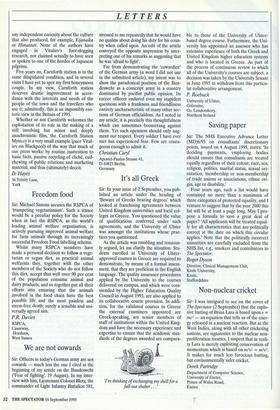It's all Greek
Sir: In your issue of 2 September, you pub- lished an article under the heading of `Beware of Greeks bearing degrees' which looked at franchising agreements between United Kingdom universities and local col- leges in Greece. You questioned the value of qualifications conferred under such agreements, and the University of Ulster was amongst the institutions whose prac- tices you questioned.
As the article was rambling and tenuous- ly argued, let me clarify the situation. Stu- dents enrolled at University of Ulster- approved courses in Greece are required to demonstrate, by means of a formal assess- ment, that they are proficient in the English language. The quality assurance procedures applied by the University to the courses delivered on campus, and which were com- mended by the Higher Education Quality Council in August 1993, are also applied to its collaborative course provision. In addi- tion, for the validated courses in Greece the external examiners appointed are Greek-speaking, are senior members of staff of institutions within the United King- dom and have the necessary experience and expertise to ensure that the academic stan- dards of the degrees awarded are compara- 'I'm thinking of exchanging my shell for a fall-out shelter . . ble to those of the University of Ulster- based degree course. Futhermore, the Uni- versity has appointed an assessor who has extensive experience of both the Greek and United Kingdom higher education systems and who is located in Greece. As part of the process of continuous review to which all of the University's courses are subject, a decision was taken by the University Senate in June 1995 to withdraw from this particu- lar collaborative arrangement.
P. Roebuck
University of Ulster, Coleraine, Co. Londonderry, Northern Ireland


































































 Previous page
Previous page